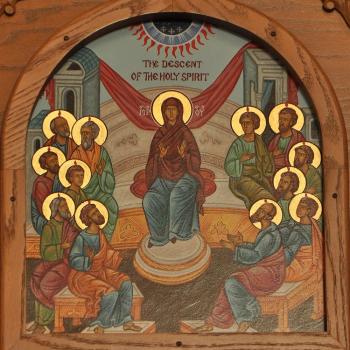 Come and drink of the grapes of God’s wrath.
Come and drink of the grapes of God’s wrath.
Pressed down and beaten for our iniquities
The vine reveals itself in a terrible bloodbath
Feeling the pressure of all external hostilities.
Drink, and be merry; drink and have your fill.
Drink, inebriate, drink and drink some more.
Intoxicated by the divinely established thrill
Drink and fall down upon the thrashing floor.
Know nothing to apprehend everything,
Drink the fruitful poison and die,
This is the way of true life with the king
As we must once and for all say goodbye.
Lift up the glass, eye the Spirit divine,
Put to sleep your egotistical mind,
As you cherish the glorious wine,
Your very self, you leave behind.
At Pentecost, the Apostles were filled with the Holy Spirit, speaking and acting as if they were intoxicated, which is why some mocked them saying that they were merely drunk (cf. Acts. 2:15). When we drink our fill of the Spirit, we also find ourselves changed. No longer self-aware, we lose the inhibitions of the egotistical self, no longer caring what others say or think about us.
We might experience this spiritual state for a short time, before which we must once again drink of the Spirit or find ourselves crashing down into the ordinary, sinful life which we have left behind. Then, we should remember the glory of the Spirit, the euphoria which we had once received, and use that reminder to seek it after it so we can be one with it for eternity. We must resist the dull, ordinary sobriety of sin; we must seek after the banquet of God, the acquisition of the Holy Spirit. We must seek after the kingdom of God, the banquet house which has God’s fiery love as its banner (cf. Song of Songs 2:4). There, we shall find ourselves in the house of wine, which Origen said, will fill us with transcendent mysteries and wisdom:
The Church, therefore, or the individual soul who longs for the things that are perfect, hastens to enter this house of wine, and to enjoy the teachings of wisdom and the mysteries of knowledge as the sweetness of a banquet and the gladness of wine.[1]
Earthly wine can be a good which helps those who are suffering from earthly griefs; this is why the Psalmist indicated that God provides us wine for temporary relief: “Thou dost cause the grass to grow for the cattle, and plants for man to cultivate, that he may bring forth food from the earth, and wine to gladden the heart of man, oil to make his face shine, and bread to strengthen man’s heart” (Ps. 104:14-15 RSV). Nonetheless, we should also understand the limitations of this earthly wine, and the kinds of troubles we can get into when we abuse it. It helps elevate us out of ourselves, to give us an experience of the death to the self, but it also does to in an earthly fashion, so that we find our carnal desires taking us over, leading us astray. We lose ourselves, but without the spiritual transcendence which we need.
Once we have been inebriated, we understand a sense of what we seek. Then, there is a danger. We can get so caught up in what little joy which we receive we end our quest, becoming attached to the earthly shadow of the spiritual wine which God is willing to offer us. In we accept that spiritual intoxication, all things will be made known:
My beloved plied me with glasses
of a wine from no wine press,
the drink of the pure
In it, all things are made manifest.[2]
If we drink up, and lose ourselves in the Spirit, the world and all that is in it will be manifest to us. All things will be manifest to us as they are in God, in the goodness and beauty which God has given to them. No longer attached to them through selfish desires, we can dance with the Spirit, exploring all things in God, enjoying God through them, elevated beyond ourselves as we participate in the divine life.
Rise up, rise into the kingdom eternal
Speak without words in drunken stupor
Dance in joy with music internal
As you become one with your true suitor!
[IMG=Flaming Cocktails by Nik Frey (niksan) [CC BY 2.5 (https://creativecommons.org/licenses/by/2.5)], via Wikimedia Commons]
[1] Origen, “Commentary on the Song of Songs. Book Three” in The Song of Songs, Commentary and Homilies. Trans. R. P. Lawson (New York: Newman Press, 1956),186-7.
[2] Abu Al-hasan Al-shushtari, “Wine from no wine press” in Songs of Love and Devotion. Trans. Lourdes Maria Alvarez (New York: Paulist Press, 2009), 45.













